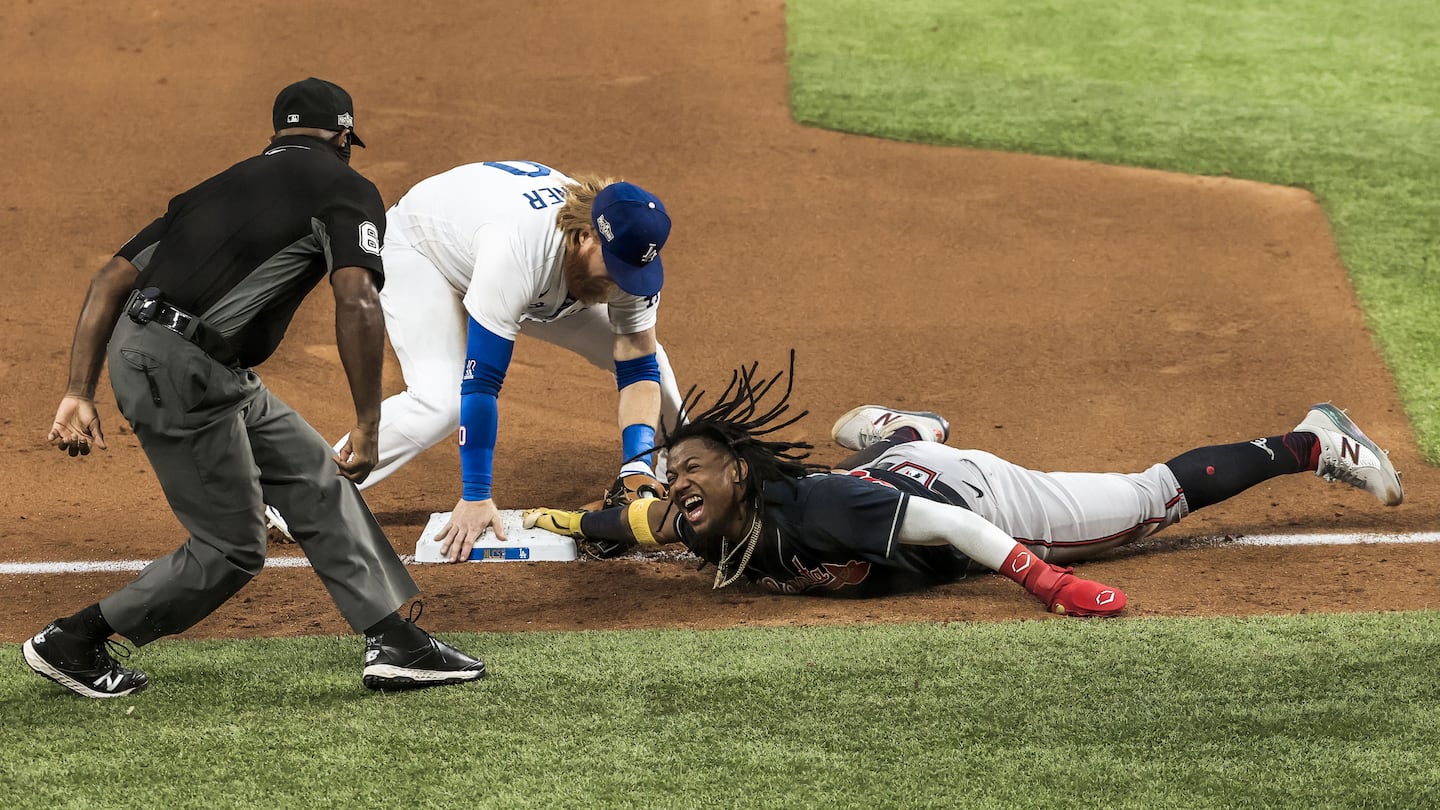Braves edge Clayton Kershaw-less Dodgers to claim 2-0 lead in NLCS

But enough significant, encouraging things happened in the late innings of Game 2 — an 8-7 loss in which the Braves nearly blew a seven-run lead — to change something in the air around the Dodgers. It was in their body language. It was in their voices.
“We were one swing — one anything from tying that ballgame,” shortstop Corey Seager said. “This is a long series.”
Maybe the Dodgers can still get the ball to Clayton Kershaw in Game 4 with a chance to tie the series. And maybe his ailing back will permit him to take it. If such a thing is to occur — and right now, the Braves, undefeated this postseason and in total command of this series, must be considered unbeatable until proven otherwise — its genesis will have been the final few innings of Game 2.
Down 7-0 entering the bottom of the seventh, the Dodgers — outscored to that point by a 12-1 margin in the series — began awakening. The catalyst: getting to face the soft underbelly of the Braves’ bullpen. Seager smashed a three-run homer off A.J. Minter in the seventh. Max Muncy blasted a two-run bomb off Josh Tomlin in the ninth.
That forced the Braves to call upon closer Mark Melancon — whom they had hoped to avoid, seeing as how he had also pitched in Game 1 — and a two-out, RBI triple by Cody Bellinger brought the go-ahead run to the plate. Only when Melancon got AJ Pollock to ground out sharply to third could the Braves exhale.
“That’s a powerful team there,” Braves Manager Brian Snitker said of the Dodgers. “Until you make the 27th out, you never feel good against a team like the Dodgers.”
“For us to be able to get Melancon in the game [after] we were down 7-0 was big,” Dodgers Manager Dave Roberts said. “To see some other arms we haven’t seen was good. There’s definitely some momentum we can take into tomorrow.”
The Dodgers may long wonder how things might have been different if Kershaw had made his scheduled start Tuesday, instead of forcing them to turn to rookie right-hander Tony Gonsolin. Wouldn’t seven runs have been enough to win behind their ace? Instead, the team announced about six hours before first pitch that he was being scratched with back spasms, an injury that has plagued him at various times over the past few years, including as recently as July.
Maybe it wouldn’t have mattered. The Braves juggernaut at this point appears close to unstoppable — Tuesday’s late stumble notwithstanding. The win was their seventh in a row this postseason, by a combined margin of 37-13. Even after their bullpen made a mess of the final few innings, their staff ERA for this postseason is 1.61.
The Dodgers’ enviable starting pitching depth afforded them the luxury of lining up five legitimate starters for Games 1-5 — a tangible advantage given this year’s unusual format, featuring games on as many as seven straight nights, with no days off. Instead, the Dodgers decided to keep roles nebulous, perhaps bringing some of those starters into games in relief and/or deploying them less as starters than as openers. That way, the thinking went, those pitchers could affect more than just the game they were assigned to start.
But that strategy assumed that a healthy, thriving Kershaw — enjoying, by all measures, a resurgent season at 32 — could be counted on not only to perform well but to eat innings in Game 2, thus limiting the workload on everyone else. With Gonsolin’s fifth-inning exit, Kershaw remains the only Dodgers starter to record an out past the fifth inning this postseason.
The next 48 hours or so are likely to be consumed with speculation about Kershaw’s condition and his prospects for taking the mound. Already, the Dodgers have said they will start 24-year-old lefty Julio Urías in Game 3. If Kershaw can’t go in Game 4, presumably that assignment would go to right-hander Dustin May. May, however, threw 1⅔ innings of relief in Game 1 — part of the Dodgers’ strategy of creative deployment. With Kershaw down, that no longer seems so smart.
On the other hand, if Kershaw does return for Game 4, suddenly the Dodgers are just a win in Game 3 away from being right back in the series. The Braves haven’t announced their Game 4 starter, but the leading candidates are a pair of 22-year-old rookies: Bryse Wilson or Huascar Ynoa. Neither is Clayton Kershaw. Game 5, if it is necessary, would present another tough decision for the Braves, one that would look a lot different if they were up 3-1 rather than tied 2-2: whether to bring back ace lefty Max Fried on short rest.
Was Tuesday’s late-inning near-comeback a sign that the Dodgers, baseball’s best team in the regular season, had finally awakened? Or was it just empty calories? The next couple of days will tell.
The Dodgers have built a regular season dynasty, claiming eight straight NL West titles, often by huge margins, and Kershaw, a three-time Cy Young Award winner and future Hall of Famer, has epitomized their enduring excellence. But the first seven of those division titles were followed by postseason disappointment, each seemingly more painful than the last. And more often than not — and whether fairly or not — Kershaw was the emblem of that futility.
An eighth opportunity arrived this month, with arguably the most complete Dodgers team of the entire run and a brilliant version of Kershaw that hadn’t been seen in years. Everything was lining up for them, until the Braves arrived in Arlington. The fortunes of Kershaw and the Dodgers are tied together, for better or worse, never more so than now.






